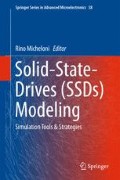Abstract
In order to avoid changing existing infrastructures, SSDs need to fit in the same physical space of HDDs and, therefore, in their power envelope. Unfortunately, NAND power consumption is strongly dependent upon the Flash operation (i.e. read, write, erase). For many generations, SSD’s power has been over- or under-estimated by adopting the worst case power consumption scenario (i.e. assuming write operations all the time); this approach is running out of steam because it always leads to exceeding power specs with the most recent NAND technologies. In order to correctly evaluate power, it is necessary to estimate the number of operations per time interval and their specific type (read, write, erase). Simulations are the only practical way to address this problem: when the prototype is ready (especially if the controller is a multi-million dollar ASIC) there are no chances to significantly reduce power, it’s simply too late! This chapter shows how a SSD fine-grained simulator like SSDExplorer can be used as a design tool for developing power management algorithms that can minimize the power consumption of the entire SSD and, therefore, open the door to an even bigger adoption of SSDs (e.g. in data centers).
Access this chapter
Tax calculation will be finalised at checkout
Purchases are for personal use only
References
Sean Barry. All Flash Array Data Protection Schemes. In Proc. of Flash Memory Summit, Aug. 2015.
Doug Rollins. Simplification: Get All Flash Performance Easily, Gradually, As Your Needs Grow. In Proc. of Flash Memory Summit, Aug. 2015.
Erik Ottem. All Flash Arrays in Healthcare. In Proc. of Flash Memory Summit, Aug. 2015.
Walter Amsler. All Flash Array Customer Case Study. In Proc. of Flash Memory Summit, Aug. 2015.
Avraham Meir. File on Flash: Delivering on the Promise of Webscale, All Flash, Distributed File Systems. In Proc. of Flash Memory Summit, Aug. 2015.
Somnath Roy. Ceph Optimization on All Flash Storage. In Proc. of Flash Memory Summit, Aug. 2015.
Jian Ouyang, Shiding Lin, Song Jiang, Zhenyu Hou, Yong Wang, and Yuanzheng Wang. Sdf: Software-defined flash for web-scale internet storage systems. In Conference on Architectural Support for Programming Languages and Operating Systems, ASPLOS, pages 471–484, 2014.
U.s. epa. report to congress on server and data energy efficiency. tech. rep., u.s. environmental protection agency, 2007.
Matias Bjørling, Philippe Bonnet, Luc Bouganim, and Bjorn Jonsson. uflip: Understanding the energy consumption of flash devices. IEEE Data(base) Engineering Bulletin, 33(4), 2010.
Balgeun Yoo, Youjip Won, Jongmoo Choi, Sungroh Yoon, Seokhei Cho, and Sooyong Kang. Ssd characterization: From energy consumption’s perspective. In Proceedings of the 3rd USENIX Conference on Hot Topics in Storage and File Systems, pages 3–3, 2011.
V. Mohan, T. Bunker, L. Grupp, S. Gurumurthi, M. R. Stan, and S. Swanson. Modeling power consumption of nand flash memories using flashpower. IEEE Transactions on Computer-Aided Design of Integrated Circuits and Systems, 32(7):1031–1044, July 2013.
Maxim max 9938, 2011. http://www.maximintegrated.com/en/products/analog/amplifiers/MAX9938.html.
M. Sako, Y. Watanabe, T. Nakajima, J. Sato, K. Muraoka, M. Fujiu, F. Kouno, M. Nakagawa, M. Masuda, K. Kato, Y. Terada, Y. Shimizu, M. Honma, A. Imamoto, T. Araya, H. Konno, T. Okanaga, T. Fujimura, X. Wang, M. Muramoto, M. Kamoshida, M. Kohno, Y. Suzuki, T. Hashiguchi, T. Kobayashi, M. Yamaoka, and R. Yamashita. 7.1 a low-power 64gb mlc nand-flash memory in 15nm cmos technology. In IEEE International Solid-State Circuits Conference - (ISSCC), pages 1–3, Feb 2015.
FLASHTEC NVRAM Drives. http://pmcs.com/products/storage/flashtec_nvram_drives/.
Jie Zhang, Mustafa Shihab, and Myoungsoo Jung. Power, energy and thermal considerations in ssd-based i/o acceleration. In Proceedings of the 6th USENIX Conference on Hot Topics in Storage and File Systems, HotStorage’14, pages 15–15, 2014.
Author information
Authors and Affiliations
Corresponding author
Editor information
Editors and Affiliations
Rights and permissions
Copyright information
© 2017 Springer International Publishing AG
About this chapter
Cite this chapter
Zuolo, L., Zambelli, C., Crippa, L., Micheloni, R., Olivo, P. (2017). Simulation of SSD’s Power Consumption. In: Micheloni, R. (eds) Solid-State-Drives (SSDs) Modeling. Springer Series in Advanced Microelectronics, vol 58. Springer, Cham. https://doi.org/10.1007/978-3-319-51735-3_7
Download citation
DOI: https://doi.org/10.1007/978-3-319-51735-3_7
Published:
Publisher Name: Springer, Cham
Print ISBN: 978-3-319-51734-6
Online ISBN: 978-3-319-51735-3
eBook Packages: EngineeringEngineering (R0)

